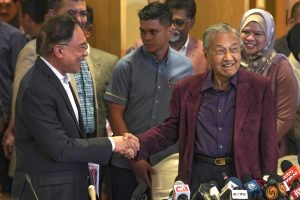Over the past few days, Malaysia’s Pakatan Harapan (PH) coalition, which in 2018 ousted the country’s ruling party in elections for the first time since the country’s independence, has effectively collapsed amid a series of political realignments culminating in the resignation of Prime Minister Mahathir Mohamad and his reappointment as interim premier. While the dust is still settling, who ends up winning the race to form Malaysia’s new government has significance not only for the fates of key political figures, but also for how politics is likely to play out in the Southeast Asian state.
As I have noted before in these pages, despite the shock victory of Malaysia’s opposition during elections in May 2018, much had remained uncertain in the country’s politics, including an expected turnover from returning prime minister Mahathir Mohamad to his former deputy prime minister-turned-opposition leader-turned-prime minister in waiting Anwar Ibrahim. While there had been mention of a general agreement reached on the transition, uncertainties remained due to the history between the two men, divisions between their parties on power sharing and political priorities, the fragility of the PH government, and shifting political dynamics as other parties in United Malays National Organization (UMNO), the leader of the former ruling coalition, continue to look to constitute themselves amid wider domestic developments.
That uncertainty continued to intensify into 2020 as well. Speculation had been rising that there could be a political realignment in the cards, where Mahathir’s United Indigenous Party (Bersatu), along with a faction from Anwar’s People’s Justice Party (PKR), may look to form a new coalition with the opposition Parti Islam se-Malaysia (PAS) and UMNO, which had ruled Malaysia since independence. And Mahathir himself had raised further questions about the transition from him to Anwar last week, indicating that he would decide when it would occur rather than handing over power at a particular time (the most recent timeframe he had mentioned being after the conclusion of Malaysia’s chairmanship of the Asia-Pacific Economic Cooperation this year).
Over the weekend, we saw these uncertainties come to a head with a series of political realignments that effectively ended the current PH coalition. After speculation that party members from the government and opposition had met to form a new government in what Anwar later confirmed were “attempts to bring down PH” – with politicians involved wanting Mahathir to remain in power for his full term rather than handing over the reins to Anwar – several members, including from Mahathir’s Bersatu, left the PH alliance, depriving it of its parliamentary majority in the country’s 222-seat parliament and effectively ending the PH coalition as currently constituted. Following a series of meetings among leaders as well as with Malaysia’s king, Mahathir tendered his resignation on Monday and was appointed interim prime minister by the king while the dust settles from the country’s political realignments.
While the end of the PH coalition less than two years after its historic defeat of UMNO is itself a significant development, what comes next for Malaysia is still unclear, including who wins the race to form the new government. Though the dissolution of the PH coalition and Mahathir’s resignation does restore a modicum of stability in the country after a frenetic few days and gives space to Mahathir to form a new government, the key question is how the realignment of political forces can lead to a majority needed in the country’s parliament, after which a new prime minister can be approved by the king and a new cabinet formed. Though Mahathir himself has remained mum amid these developments, at the time of writing, members of both the current government and opposition have been working to secure support for a new government behind the scenes, and Malaysia’s king has been interviewing all lawmakers himself to assess the state of their support.
Meanwhile, civil society groups have been expressing their own concerns about backroom dealing that could derail the change of government they had supported just under two years ago. Their voices have been an important reminder that this is not just about which personalities are in power, but also about the hopes for wider reform that had helped bring the PH coalition into office in the May 2018 elections. As such, any unpopular political realignments seen as interfering in that government mandate could have implications for the country’s political stability.
Given all this, who wins the race to form Malaysia’s new government and how exactly things play out in Malaysian politics will be important to watch over the next few days. Developments there will have important consequences not just for who is in power for now, but how the country functions and how its politics evolve further out in the next few months and beyond.

































